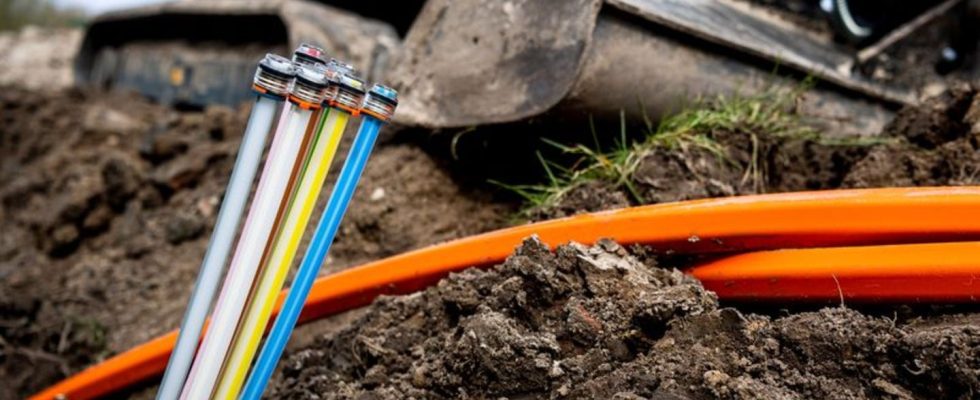Internet
Superstructure problem: Authority expresses caution
For faster internet: fiber optic cable on a construction site. photo
© Sina Schuldt/dpa
When it comes to fiber optic internet, the word superstructure is causing trouble in the telecommunications industry. Smaller companies are angry with Deutsche Telekom. An authority has looked into the matter.
In the debate about the controversial double expansion of fiber optic internet, it remains the same For the time being, Deutsche Telekom is spared the state taking action. The Federal Network Agency published an interim report on the practice, also known as superstructure. In the letter, the regulator expresses caution. He does not see any serious misconduct by the Magenta Group.
There are 427 areas in which first one company announced fiber optic expansion plans and then a second company did the same. Then there is a risk of double construction work at the same location. This is considered problematic in times of limited construction capacity. After all, the excavator can be missing where there is no fiberglass yet. In addition, the business prospects of the first, “overbuilt” company are worsening – after all, they have to reckon with the fact that some of the households on a street do not want to have a contract and instead go to the competition.
Accusation of Telekom: Fiber optic expansion is being slowed down
For Telekom competitors – such as the industry associations Breko, Anga and VATM – the topic is a red flag. They accuse Telekom of using the superstructure strategically and thereby slowing down the overall fiber optic expansion in Germany. Telekom, in turn, rejects the allegations and emphasizes that such infrastructure competition is normal and that local monopolies are not in the interests of consumers. CEO Tim Höttges repeatedly notes in the debate that they are also being overbuilt – for example in Bonn, where Westconnect announced expansion plans, even though Telekom had long been present there with fiber optics. But one thing is also clear: As a large corporation, Telekom can cope better with being overbuilt than its smaller competitors.
In the 427 cases contained in the report, the number of areas in which Telekom is building over competitors and the number of areas in which it is being built over are roughly equal. The authors critically note that Telekom often reacted at short notice to a competitor’s start of sales – according to Magenta’s competitors, this is particularly questionable. The Anga Association interprets this passage of the report as evidence of a need for action on the part of the state.
“The superstructure allegations are collapsing like a house of cards”
However, the authors soften their gentle criticism of Telekom by pointing out that the cases analyzed were reported by different companies. This information could often not be fully verified. A reliable competitive assessment is not yet possible based on the reports, explained head of the authority Klaus Müller. “There is still a great need for information.”
While Telekom’s competitors interpret the interim report as confirmation of their allegations, the market leader draws a different conclusion: “The superstructure allegations are collapsing like a house of cards,” explained a spokesman. “Firstly, the number of cases is low given that there are 11,000 municipalities in Germany, and secondly, in half of the cases Telekom is overbuilt.” In addition, there is no strategic superstructure by Telekom.
Notice from the Federal Network Agency

